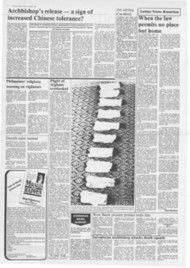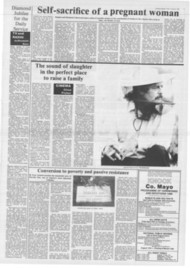Page 3, 15th January 1988
Page 3

Report an error
Noticed an error on this page?If you've noticed an error in this article please click here to report it.
Tags
Share
Related articles
Battle Lines Drawn
Catholic Mp Poised To Announce Plans For Private Members'...
Commons Threat To Alton Abortion Limit
Abortion Campaign Gets Top Lobbyist
Watering Down Of The Abortion Bill Feared
Humanitarian aspect to abortion reform takes centre stage
NEXT Friday, January 22, is the most important day in the history of the pro-life movement for 20 years. David Alton's Abortion Amendment Act is presented to the Commons and the decision on whether or not to grant it a second reading will be taken. If it passes this formidable hurdle, it then faces the tougher obstacle of the notorious "committee stage", where the last 14 pro-life bills have been destroyed.
Alton remains quietly confident that he can win the vote, but his opponents are equally sure that his proposal to reduce the upper time limit to 18 weeks is too ambitious, and that his Bill will never survive the parliamentary minefield.
"So far I've had 170 MPs promise me that they will support my bill, including the Home Secretary, Douglas Hurd", he told me. "At the moment it looks as though it's about even stevens, and a lot of members are under a tremendous amount of pressure from their parties to vote against the Bill, even though it's supposed to be a non-party political issue".
One such MP is Catholic Ronnie Campbell, the Labour member for Blyth Valley. The local women's section of his party insisted that he vote against the Bill, but his wife was adament that he should not. He has decided to back the Alton proposals on Friday.
A major factor in the way many Conservative MPs will vote depends on Mrs Thatcher's decision. She intimated during the General Election that a private member's bill was the best way to deal with the topic, but whether she will support a reduction to 18 weeks remains unclear. Many ambitious Tory backbenchers are expected to follow her lead.
Robert Maclennan, the leader of the SDP, is equally noncommittal. The son of a former President of the Royal College of Gynaecology, he is said to have called for the advice of several medical experts and plans to vote on the basis of the arguments he hears during the parliamentary debate itself.
Liberal leader David Steel is opposed to the Bill, as are the majority of Liberal MPs, and David Owen, but fellow mould breaker Shirley Williams has signed an advert in The Times supporting it.
Although the national women's associations of all the major parties are officially against the Alton Amendment, it is Labour MPs who are under the strongest pressure to vote against it, and many on both sides of the argument are expected to be "unavailable" for the debate on Friday, and so will not be recorded in Hansard as
supporting or opposing the Bill.
If Alton survives the vote on Friday, the Bill will be considered by a committee which will be comprised of MPs for and against the proposals. The proportion of committee members sympathetic to Mr Alton will depend on the majority he wins Friday's vote by. For example, if MPs vote by two to one for the 18-week limit, then the committee will be chosen so that there are twice as many supporters as opponents.
The proportions are unlikely to be that uneven, however, and the committee (which will have about 18 or 20 members) is likely to be split fairly evenly. It is here that amendments and timewasting tactics are likely to be attempted by the opposition, but David Alton believes that once abortion has been accepted as a humanitarian issue and not a social one, he has achieved moral victory.
"One of the things I hoped this Bill would do is reopen the whole debate on the subject throughout the country, and it certainly has", he said.
"Because I'm a Liberal, and many of those supporting me are from parties opposed to the Government, pro-lifers can no longer be dismissed as moral majority fanatics or Catholic zealots. Now it's perfectly respectable for progressives to speak out against abortion."
Whether the climate of opinion in the country as reflected in the Commons is ready for such a major amendment to the abortion law remains to be seen, and many observers believe that the Alton Bill cannot go through in its present form. If it is changed to set the upper limit at 22 weeks, or widened to include exceptions for foetuses who will be born handicapped, then its success is almost guaranteed., At present, the Bill allows abortions after 18 weeks only if the mother's life is in danger or if a foetus is likely "to be born dead or with physical abnormalities so serious that its life cannot be independently sustained".
This category would not include children born with deformities like spina bifida. If David Alton is successful on Friday, the new battle begins to resist the hi-jacking of the Bill. Both sides are already preparing for the second phase of the struggle, which promises to be as hard-fought and bitter as the first.
blog comments powered by Disqus











